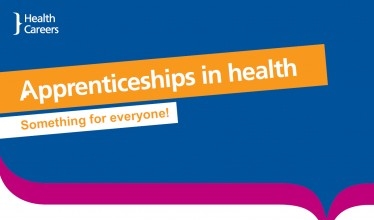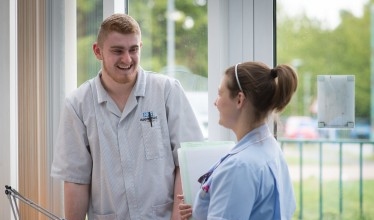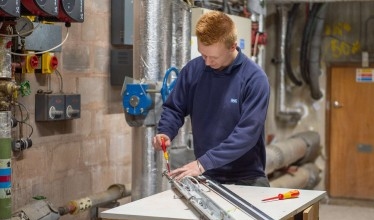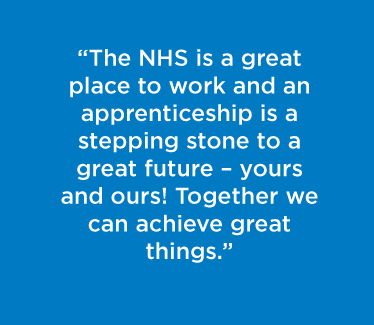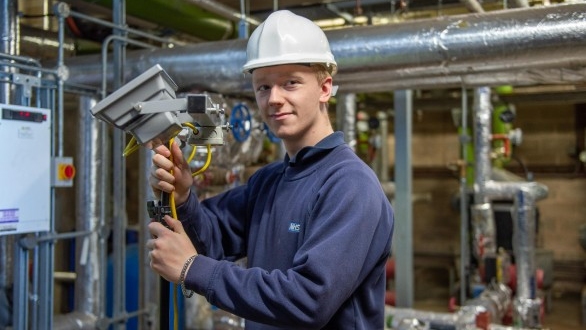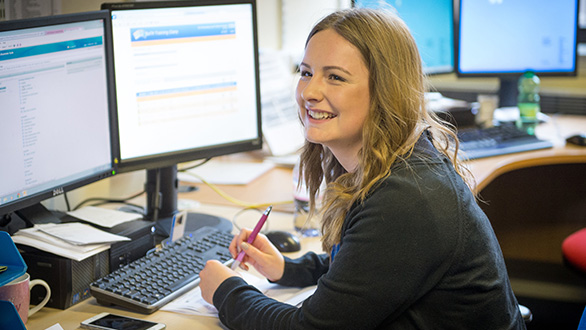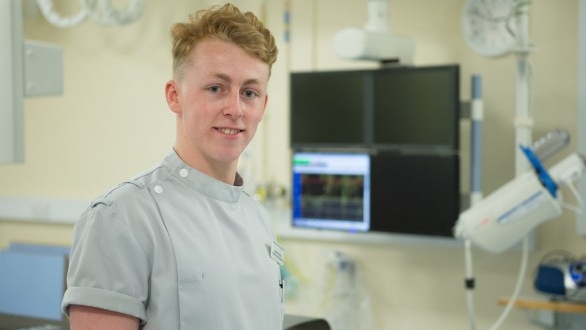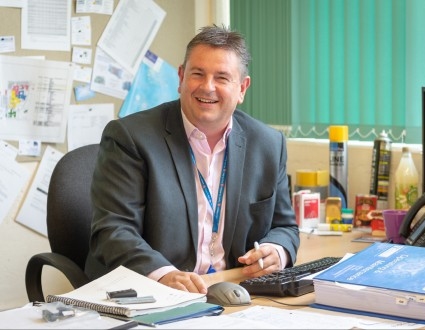All current apprenticeship vacancies will be displayed below and updated as apprenticeships become available.
Should you have any questions about apprenticeships please email Sarah Thomas on sarahthomas@nhs.net
Benefits of an apprenticeship:
- Earn a salary while gaining a new qualification
- Boost your future earning potential
- Complete an apprenticeship at any point in your career
- Develop new skills without being in full-time education
- Still get paid holidays and other staff benefits
- Choose from over 350 clinical and non-clinical apprenticeships
Apprenticeships are work-based training programmes designed around the needs of employers, which lead to nationally recognised qualifications. In the NHS, primarily but not exclusively, they can be used to develop staff.
It's a myth that you choose a route of either university or an Apprenticeship, or Apprenticeships are for people who can't get into university. Or that Apprenticeships are just for young people - they are open to anyone of any age. Apprenticeships are now available at a variety of levels up to, and including, degree level, in a wide variety of vocational areas, with more being developed all the time.
Click here to explore more about what an apprenticeship is and the different types which may be available to you.
The huge benefit of undertaking an Apprenticeship is you can earn whilst you learn, and have no training or tuition fees to pay. In addition, you will gain a qualification and valuable experience in the workplace making you more attractive to future employers.
Apprenticeship Qualifications are available for existing staff, but they can also be utilised to encourage and recruit new staff into the Trust. The NHS is a well-respected and globally recognised employer. If you are successful in achieving the Apprenticeship, you may well be offered a permanent post within the team or the wider Trust.
See below for our current Apprenticeships or follow this link for further information: NHS apprenticeships | NHS Health Careers
- A well qualified, highly skilled and motivated workforce that meets the needs of existing and new patient pathways and service models, it can assist with role redesign.
- Attract talented people of all ages, apprenticeships can be undertaken by people from 16 years of age until retirement age.
- Greater staff retention through increased engagement and motivation, enhancement and recognition of skills. Opportunities for career progression and promotion.
- Improved productivity and performance, ultimately benefiting patients and service delivery.
- A long-term, ongoing solution to developing skilled staff, apprenticeships can be used as a route of progression.
- A good way to engage with local communities and boost local economy, encouraging local people into our organisation, working with local training providers.
Apprenticeships can be undertaken by both new and existing employees. They can be used to embark on a career path or to progress. Anyone who is a resident in the UK, over 16 and not in full-time education can undertake an apprenticeship, there is no age limit. There are several levels of apprenticeship now available.
- Intermediate Level Apprenticeships (equivalent to 5 good GCSE grades A*-C/9 – 4)
- Advanced Level Apprenticeships (equivalent to two A-level passes)
- Higher Level Apprenticeships (equivalent to a foundation degree)
- Degree Level Apprenticeships
- Masters Degree Level Apprenticeships
An individual cannot undertake an Apprenticeship which would duplicate previous learning i.e. they do not have a qualification in the same Vocational area at the same or at a higher level. They can undertake a qualification at a lower level that one they have already attained as long as this rule is fulfilled.
Example 1: Someone achieved a Degree in History - they can undertake a Healthcare Support Worker Intermediate Apprenticeship.
Example 2: Someone achieved a Medical Administration Advanced Apprenticeship – they couldn’t undertake a Business Administration Apprenticeship at Intermediate or Advanced level.
There are many different types of apprenticeships available; many used in the wider economy are also relevant to the NHS, such as:
- Business Administration and IT
- Team Leading and Management
- Customer Service
- Catering
- Engineering and Maintenance.
In addition, there are also apprenticeships specific to the Healthcare environment:
- Healthcare Support Services
- Healthcare Support Worker
- Healthcare Science
- Operating Department Practice
- Associate Nurse
- Registered Nurse
- ... more in development.
Most job roles in the NHS will have a relevant apprenticeship available to underpin the development of staff in that role. To find out if there is one available for the roles in your work area contact the Education Team on 01952 641222 Ext 2956/4828
All vacancies for an Apprenticeship post are advertised on the Trust recruitment website www.jobs.sath.nhs.uk in addition to the Government ‘Find an Apprenticeship’ website: https://www.gov.uk/apply-apprenticeship.
Entry requirements for specific Apprenticeships are set by the Employer and the Training Provider depending on the qualification being undertaken. Each Job Advert will contain a Person Specification outlining what these requirements are and will also contain the Job Description explaining what the role entails. The duration of the Apprenticeship and the salary is also included in the advert.
Please take a look at our brand new Apprenticeship brochure for further information on all apprenticeships available within SaTH:
SaTH Apprenticeships by The Shrewsbury and Telford Hospital NHS Trust - Issuu
An Apprenticeship is based on an approved new Apprenticeship Standard. All approved Apprenticeship Standards can be seen on-line at: https://www.instituteforapprenticeships.org/apprenticeship-standards/
The Standard outlines the requirements needing to be fulfilled to achieve the Apprenticeship including:
- The values and behaviours to be demonstrated
- The skills and knowledge to be demonstrated; which could be underpinned by an assessment, a competence based qualification or an academic qualification.
- The level of numeracy and literacy skills to be achieved.
Culminating with an end point endpointt which could include a 1:1 interview, an observation in the workplace or a written examination.
The training period for an apprenticeship can be as little as 12 months, however for the more complex apprenticeships e.g. Engineering or Healthcare Science it can be 3 or 4 years. The Institute of Apprenticeships sets a suggested time (duration) in which to achieve each specific qualification based on a working week of 30+ hours.
Since 2017 there has been a requirement set by Government for any Apprenticeship to incorporate 20% ‘off the job’ training, this is capped at 6 hours per week in working time. This is logged and can include:
- The teaching of theory (for example, lectures, role playing, simulation exercises, online learning, manufacturer training).
- Workplace continuous professional development (CPD) e.g. fire awareness, tool box talks, information governance.
- Secondments to other departments/other organisations to learn alternative skills/methods (must be a different experience to the normal working practice)
- Opportunities to undertake projects or additional tasks beyond the job description which extends learning.
- Practical training; shadowing; mentoring; industry visits.
- Learning support and time spent writing assessments/assignments.
Off-the-job training does not include:-
- English and maths (up to Level 2).
- Progress reviews or on-programme assessment.
- Training which takes place outside normal working hours (cannot count towards the 20% off-the-job training unless time in lieu is given)
As a guide the 20% off-the-job training can be supported by:
- Time within each working day
- Time concentrated into 1 day each week.
- Blocks of training throughout the Apprenticeship
- A combination of methods
The total requirement over the whole of the apprenticeship is calculated at the start.
Many qualifications require minimal time out of the workplace with much of the learning taking place in the department learning the new skills and knowledge required for the role alongside colleagues, supervisors or managers. A trainer from the training provider guides the Apprentice in their learning.
Some qualifications require attendance at workshops to provide theoretical input, some require weekly attendance at a college or training providers site, some are tested using formal exams. The time out of the workplace should be indicated by the training provider before the qualification commences.
Since April 2017 all large employers have paid an Apprenticeship Levy collected through the Employment & Skills Funding Agency, this money is available to fund Apprenticeship training programmes, it does not fund salaries.
Each Apprenticeship is allocated to a funding band, identifying the maximum that can be funded through the Levy. The employer signs an Apprenticeship Agreement with their chosen Approved Training Provider to deliver the Apprenticeship, a proportion of the funds are transferred on a monthly basis from the Employers Levy fund to the Training Provider electronically. If an Apprentice has a period of long-term sickness or maternity leave the transfer can be suspended until they return, if they leave employment or their work role changes significantly the payment can be stopped.
Customer Service Practitioner Level 2 Apprenticeship
Evie Heath – Legal Services Department Apprentice
My current apprenticeship at The Shrewsbury and Telford Hospital is actually my first job. So, before I began my apprenticeship, I was in my final year of school practicing, learning and revising for my upcoming GCSE’s. I didn’t end up sitting actual exams due to the COVID-19 pandemic, however we did do many assessments in class on the daily so my time in year 11 consisted of a lot of exams.
I wanted to do this Legal Services apprenticeship as I have always been super interested in the law and the justice system, so when I found out I could start of my knowledge at the age of 16 through an apprenticeship I was thrilled. I also have always had a real passion for helping people in need and knew working in the NHS I would be able to do so on a daily basis and finally knew I’d be getting paid alongside getting a level 2 customer service qualification which is great as I’ve always endeavoured to earn and be successful from a young age as best as I can.
I found the job role on the SATH job vacancies website and was instantly interested in applying. I started writing up my CV and personal statement and sent it off via the link I was provided with.
The interview for my job role was actually via Teams due to the COVID-19 pandemic. Everyone was very professional but very friendly, so I instantly felt at ease. I was asked a series of questions about myself and my experience, a series of questions about the job and then a series of value based questions. The turn around time for founding out if I got the job was very quick, the same day even, so that was great that I wasn’t nervously waiting around for too long.
My current job role as Level 2 apprentice entails dealing with Subject Access Requests daily. Lots of steps are involved in this some include copying medical records, contacting patients, liaising with clinical staff and looking into patients care at the hospital. Much more is involved than this but they are just some of the most interesting parts.
The team I work with are amazing. They have always supported me right from the beginning making sure I get/got all the training and help I needed. I have never felt awkward to ask for help and have always received the help I need. We all work really well together which makes the job so enjoyable.
I have monthly meetings with my college assessor. These meetings are used to review my coursework or assign coursework to me. They are usually a hour to two hours long and in this time my assessor will thoroughly go through my coursework with me highlighting areas I need to focus on and discuss my progress with me. I also use this time to upload my coursework to my online college file. We also have 10-week reviews where myself, my college assessor and my manager have a meeting discussing my job and apprenticeship progress. At the end of my apprenticeship, to determine my results, I am assessed in three areas by: an observation, written coursework evidence and a professional discussion.
I couldn’t have made a better choice than doing a apprenticeship with SATH Legal Services. I have enjoyed it so much and I am so glad I have had such a pleasant first job experience. I have learnt so much over the 14 months and I am happy to say I got Distinction results in all 3 areas! Some challenges along the way consist of balancing your job workload with your college workload, finding the time to get these both done up to standard can sometimes be challenging but with the right work ethics and support around you it is very doable!
I would 100% recommend an apprenticeship with SATH to anybody looking at different options. I couldn’t be happier with where it landed me. I am now going on to begin a Level 3 Business Admin apprenticeship with Legal Services. I cannot wait to see what the future holds for me!
Healthcare Science Assistant Level 2 Apprenticeship
Job role: Audiology Technical Officer Trainee
Hannah Littleford
I started working in the Audiology department in June 2019 as an apprentice clerical officer, where I gained my Business Administration Level 2 qualification. Towards the end of the programme, I was offered a full-time position and joined the administration team as a clerical officer in February 2020. I worked all throughout the Covid-19 pandemic, offering a telephone and postal service to our Shropshire Audiology patients and making visors for the wards as part of our department’s redeployment. In September 2021, I started a new clinical role as an Assistant Technical Officer trainee. This role involves face to face repair clinics where I will eventually see my own patients and carry out hearing aid services, maintenance, programming up replacement hearing aids and doing otoscopy and impression taking for new ear moulds. The course is 14 – 16 months long and I participate in fortnightly online lectures and assignments to work towards a Health Care Science Assistant Level 2 qualification.
I am really enjoying my new role as an Assistant Technical Officer in Audiology. I love the hands on and patient interaction aspect of it as I feel I am making a difference to the patient’s everyday life. I have always wanted to progress into a clinical role but was never sure if this would be possible for me as I have not been to university, however my department and management have been so supportive and given me the opportunity to do just that.
For more information about the variety of support roles in Healthcare Science follow the link below:
Healthcare science assistants and associates | Health Careers
Diagnostic Radiographer Level 6 Degree Apprenticeship
Kerry Johnson – Trainee Radiographer
I started 3 year Programme in September 2020 with the University of Exeter
I have worked in the Radiology Department for 7 years, starting as a Radiology Assistant. In 2016 I went to Birmingham City University to do a Foundation degree in Health and Social Sciences (Diagnostic Radiography), this enabled me to progress my career from Radiology Assistant to Assistant Practitioner.
I always wanted to progress my career further and challenge myself. The apprenticeship for Diagnostic Radiography is fairly new, this opportunity is enabling me to continue challenging myself and progressing my career.
The programme is mainly putting knowledge into practice within the Radiology Department, with 3 block weeks of lectures at the University of Exeter
Additionally, we have regular tutorials (via zoom) and self-directed study sessions
This is an amazing opportunity, I am enjoying expanding my knowledge further and putting it into practice. It can be challenging to get motivated sometimes academically with online learning, especially as we don’t have set objectives each week. As an apprentice I feel like I am part of the team, the support from both University and department is excellent.
I would 100% recommend apprenticeships to others, engaging on practical aspects really helps prepare for a future career.
For more information about careers in Radiography please follow the links below:
Radiography assistants and imaging support workers | Health Careers
Radiotherapy Course, Therapeutic Radiographer - Health Careers
Engineering Careers in the NHS
People never think about the diversity of roles in the NHS and the wide variety of opportunities that are available. Here one employee explains how an Apprenticeship opened up a career pathway in Engineering.
Dave Lewis is now the Estates Site Manager at the Royal Shrewsbury Hospital, his career pathway through Estates and into a Senior Management position was made possible through the Shrewsbury and Telford Hopsital NHS Trust (SATH) apprenticeship programme, investment in his education and his own hard work to excel at both college and in work.
Dave started at the Trust with very basic Engineering Qualifications; City & Guilds 20-10 and Performing Basic Engineering Operations Level 2 NVQ were completed after he left school.
He joined the SATH Estates Team as a Mechanical Maintenance Assistant at Band 2. Soon after his appointment to the Trust his Career path started.
Dave explains how the Apprenticeship route has helped him to progress in his chosen career - “In 2006 I had been offered an opportunity by my manager at the time, to go through an apprenticeship (Level 3 Engineering), the Trust were willing to develop my skills and support me financially to go to college so I could eventually become a Mechanical Technician. I gratefully took the opportunity and committed myself fully to the advanced apprenticeship course which took three years to complete, picking up student of the year and gaining distinctions along the way. Following a further two years in higher education I studied and completed a HNC/HND in Electrical Mechanical Engineering. The apprenticeship programme and subsequent Higher Education has given me greater choice in my career path with the NHS. I have worked in various roles within the Estates team, being exposed to a wide variety of experiences and gaining expertise from being an Apprentice, Mechanical Technician, Decontamination Technician, Assistant Manager which have all enabled me to now progress to being a Site Manager”
“Succession planning is important to the Trust and particularly Estates, our skillsets can be very niche and difficult to aquire within industry due to the environment that we operate in. The Trust Apprenticeship programme is an established way to improve skills and help provide career choices and progression routes for both our existing substantive staff and our prospective employees whatever their education level.”
Estates Apprenticeship opportunities within the Shrewsbury and Telford Hospital NHS Trust
Both the Royal Shrewsbury and Princess Royal Hospital, Telford sites have a dedicated Estates Team who cover a wide variety of skills to service and maintain the buildings in which we deliver care to our patients and the community while also providing a safe workplace for over 6000 employees. A hospital environment is quite specialised, in order to keep it safe and everything in good working order 24/7 every day of the year requires people who are skilled in:
- Mechanical
- Building craft (carpentry)
- Painting/Signwriting
- Electrical
- Grounds
Specialist equipment can include: Heating and Ventilation Systems, Medical gas, Air handling units, Decontamination, Fire Systems, Lifts, Bed Head Services, Low voltage and High voltage electrical Systems, Water and Drainage Systems
Over recent years Apprenticeships have been utilised to develop our people especially with Mechanical and Electrical skills. In 2021 it was recognised that to be able to continue to deliver a high calibre service there needed to be an investment in opportunities to bring younger people into the team. Therefore in September 2021 six new Apprenticeship posts were recruited to across the 2 hospital sites.
For further information about roles in this area see the national Health Careers website links below:
Carpenter/joiner | Health Careers
Estates services | Health Careers
Molly Saunders - Legal & Security Services Apprentice
Business Administrator Level 3 Apprenticeship - 18 month programme
I started by doing a Business Administration Level 2 apprenticeship with SaTH.
I wanted to do the Level 3 apprenticeship to continue to grow my qualifications and stay within legal services and one day complete a Law Degree, studying for my Level 3 has helped me to gain a lot of knowledge and experience needed in my workplace to complete a degree.
In normal times my programme required me to attend 6 college taught lessons. As I haven't been able to do that this year, I have been attending 1:1 teams calls with my assessor to do the taught lessons/mock exams and get advice on the work I have completed. It requires me to write a lot of my 'on the job' training down and to have an extensive role and knowledge of my work to be able to complete the course.
I can honestly say working in the Legal Services Team and gaining the knowledge and experience I have and completing both of my qualifications is one of the best decisions I have made in my life. I love the course, my job and the training and the things I get to be a part of because of it.
I would 100% recommend it to anyone who wants to learn and develop in a role within SaTH.
Hopefully I will gain a substantive post to be Legal Services Clinical Negligence Administrator.
Molly has since secured a permanent post within the team. The team are now supporting a further apprentice.
Aravind Bhaskaran - Nursing Associate
Level 5 Nursing Associate Apprenticeship - 24 months
I was working in Ophthalmology since 2015 and always wanted to progress in my career. With the support of my manager, I got seconded to do this course, which helped me to develop into my role through the academic training from University of Wolverhampton and clinical training/development from SaTH.
My job is all about holistic care of the patients, my favourite part is being able to act as an ambassador for my patients, providing person centred care.
Nursing Associates is a new terminology in the nursing career and the training that we undertake has got a completely different approach to the traditional training. While training, we are counted in the HCA (Healthcare Assistant) numbers. Working as a HCA and finding the opportunities to gain all the relevant competencies is a big challenge.
I managed to balance my family life and the Nursing Associate course.
Aravind is now a qualified Nursing Associate and has taken up the opportunity to become a Registered Nurse through a shortened 'top up' Apprenticeship route over 18 months.
The full Registered Nurse Degree Apprenticeship is over 3 years.
Skye Talbot - Plaster Room Apprentice
Senior Healthcare Support Worker Level 3 Apprenticeship - 18 month programme
I wanted to do this as I believe I am a caring and compassionate person, who likes the sense of achievement gained when helping people, from being a patient in the Plaster Room myself previously I could see this was a role that would give me that.
This apprenticeship seemed different to others I had heard about, more interesting, with a lot more opportunities that would come with it.
I have an apprenticeship assessor who sets me my work on a regular basis and organises meetings to talk about my progress. My work colleagues write and sign to say they have seen me undertake certain activities.
I am really enjoying my apprenticeship, it's a fantastic department to work in. The Plaster Room team have been so welcoming and have a great way of teaching. I can truly say I've learnt and seen something new each day.
I would definitely recommend this apprenticeship to others, personally I feel it's a great way of learning, whilst getting the hands on approach and developing so many more skills.
Matron's comments: We looked at developing an apprentice post to encourage young people from a variety of backgrounds, providing the unique opportunity to learn and develop within a clinical/medical setting. We wanted to share our teams' knowledge and skill sets with the individual to create in house learning and develop our future workforce within the plaster room. Skye has been an absolute asset and has become a valued member of the team.
Medical Engineering
CLINICAL ENGINEERING APPRENTICESHIPS
Healthcare Science (Clinical Engineering) Degree Apprenticeship Level 6
Job Role – Medical Engineering Apprentice.
Work base: Royal Shrewsbury Hospital Medical Engineering Department.
Kurran Singh Rai - Started 3-year Programme in October 2019 with the University of West England (Bristol campus)
I wanted a career where I could help people with the skills that I have and doing something I enjoy. I enjoy repairing various devices so a degree that lets me do both is a no brainer for me.
I previously worked as a design engineer for the oil and gas industry, which wasn’t fulfilling as I was not helping anyone.
I left that job and began at another university for a degree in mechatronics, as I wanted to become a medical engineer. Another reason why going through this apprenticeship was an obvious option.
I attend virtual lectures every Wednesday for 2 hours.
Every 3 months I go to the University of West England for a week to attend actual lectures and complete exams.
I must conduct certain competencies at work to fulfil my university specification as well as work specifications. As part of my training I rotate through the 3 departments so I can learn as much as I can and various methods of repair.
I am thoroughly enjoying my time here. I am always kept busy and there is a very nice atmosphere. I especially enjoy the rotation as that means there is always something new to learn.
The main challenge is thinking of how to repair equipment when damaged, but this is what makes the job more interesting because of the adaptability of the role.
When I complete my studies I will be a qualified Medical Engineer
I would most definitely recommend this apprenticeship to everyone. It is a very fulfilling career and is very fun learning in the team.
Healthcare Science (Clinical Engineering) Degree Apprenticeship Level 6
Job Role – Radiotherapy Physics Engineering Apprentice.
Work base: Royal Shrewsbury Hospital Radiotherapy Department.
Mike Evans - Prior to this role at SaTH, I completed a two year foundation degree in Electrical and Electronic Engineering. I have always had an interest in how things work, and decided I wanted practical career. When I saw the role advertised I felt it would be ideal for me – I have the engineering skills, as well as being keen on the idea of a role that is rewarding and you can make a positive impact. I have been part of the Engineering team within Radiotherapy Physics for over 2 years- now, I have had chance to learn a lot from the senior Engineers, gradually expanding my knowledge and practical skills.
“The day starts with the run up of the linear accelerators, completing ‘Machine Performance Checks’ to ensure they are fit for clinical use before handing them over to the radiographers. We are also responsible for preparing the Orthovoltage X-Ray treatment machine, used to treat superficial cancers. This includes powering on, warming up and performing checks to ensure the machines are performing as expected. The majority of the day involves shadowing the senior Engineers as they investigate any faults that arise on the machines within the Radiotherapy Department. This has allowed me to gain some insight into how to approach a fault on a machine, making sure to work safely following the relevant regulations. I also assist in designing and constructing additional components used as part of treatment, for example modifications to patient immobilisation boards.
“The remainder of my time is focused on completing a degree in ‘Healthcare Science’ through UWE Bristol in order to obtain RCT (Register of Clinical Technologists) registration. This involves attending online lectures, studying provided presentations and completing coursework.
“My favourite part of the job is that I have the opportunity to learn about how the treatment machines function, and the chance to see how the internal components work together. It is an incredibly exciting field to be learning about, and I’m grateful to have been given the opportunity to join the team and expand my skills.
All 3 of the Medical Engineering Apprentices, together with a colleague in Radiotherapy Physics successfully completed their degree in summer 2022.
During 2022 both the Medical Engineering Team and the Radiotherapy Physics Team within the Trust recruited further Apprentices to undertake these Apprenticeship programmes.
For further information see the Health Careers website links below:
